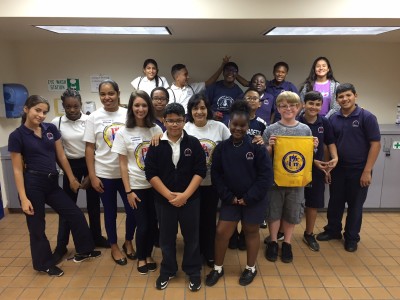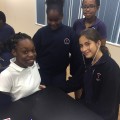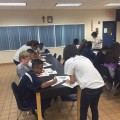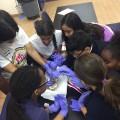NSU Newsroom
SharkBytes
Horizons
This version of NSU News has been archived as of February 28, 2019. To search through archived articles, visit nova.edu/search. To access the new version of NSU News, visit news.nova.edu.
This version of SharkBytes has been archived as of February 28, 2019. To search through archived articles, visit nova.edu/search. To access the new version of SharkBytes, visit sharkbytes.nova.edu.
Halmos Faculty and Students Lead Seventh-Grade Class in Exploring Physiology
Participating in the 2016 PhUn (Physiology Understanding) Week, faculty and students at NSU’s Halmos College of Natural Sciences and Oceanography led seventh-grade students in hands-on learning and activities that explored the functions of the human body and the physiology of exercise and health.
Deanne Roopnarine, D.P.M., associate professor, and biology majors and seniors Crystal Acosta and Jodie Chong met with the seventh-grade class of Carmen Paz at St. Bernadette Catholic School in Davie, Florida, on November 9, 2016.
The middle school students learned about the cardiovascular and muscular systems by monitoring their own heart, pulse, and respiration rates before, during, and after they exercised. They also examined the dissected heart of a cow to learn about the relationship between anatomy and physiology.
Held November 7–11, 2016, PhUn Week is an annual outreach program for K–12 students. Having just marked its 11th year, the initiative is coordinated by The American Physiological Society, a scientific organization with 11,000 members.
“The event is an effort to create partnerships between universities and local elementary, middle, and high schools,” Roopnarine said. “The American Physiological Society believes that exposing students to science early will produce the scientists of the future. We utilized interactive methods to increase the interest of the students and had them relate exercise to health, something with which they are already familiar.
“The students were very enthusiastic. After a brief lecture, they were able to complete handouts and then learn to take their pulses, listen to heart sounds, and examine a dissected cow’s heart. They were so excited to see and learn from an actual heart.”
The event gives students an opportunity to meet and learn from scientists, learn about physiology in their daily lives, and explore physiology as a possible career. It also builds local partnerships between K–12 science teachers and university science faculty. More than 14,000 students across the nation participated in PhUn Week this year.
“This gives me an opportunity to let young people learn how interesting science is and how it relates to everyday life,” Roopnarine said. “My undergraduate students who accompanied me also realized the importance of teaching the next generation and the need to generate enthusiasm for science. In addition, we were able to represent NSU. At the end of the session, a number of the seventh-grade students had questions about future careers and about NSU.”
- Seventh-grade students in hands-on learning and activities
- Seventh-grade students in hands-on learning and activities
- Seventh-grade students in hands-on learning and activities



